Located in Egypt, people referred to COP27 as the “African COP” with the hope for a focus on equity and supporting developing countries who will be disproportionately impacted by the climate crisis.
Let’s look at what we achieved during COP this year and what remains undone.
COP27 achieved the first ever “Loss and Damage” Fund in history. Big developed nations, like the US and those in the European Union, are major contributors to the climate crisis as they have released the largest amounts of greenhouse gasses. Thus, G77 members, which is a coalition of developing countries, amplify that those most responsible for emissions should pay for the cost of damage for nations most affected by climate impacts. However, who will pay into this fund, how much, and which countries will benefit was not established and pushed off until COP28. On a positive note, agreements confirmed to operationalize the “Santiago Network”, which is a platform that connects developing countries to technical assistance and resources to address loss and damage.
Developed countries previously committed to providing US$100 billion by 2020 to developing countries to finance mitigation projects, to reduce nations’ greenhouse gas emissions, and adaptation projects, to build more resilient infrastructure to climate impacts. However, this goal was not meet with countries only providing US$83.3 billion in 2020. COP27 had plans to double the adaptation finance; however, no new goals were developed, and the commitment for doubling adaptation finance was pushed till 2025. Additionally, studies have shown that developing countries actually need US$1 trillion in 2030 to support external finance – far off from current commitments.
COP27 failed to get a commitment from all parties to phase out fossil fuels – the main cause of global warming. Vague language was included instead to “[accelerate] efforts towards the phase-down of unabated coal power and phase-out of inefficient fossil fuel subsidies”. This is included in the Sharm el-Sheik Implementation Plan which summarizes the main decisions determined during party negotiations. The words “unabated” and “inefficient” allow for interpretation and loopholes that continue the use of these high carbon-emitting resources.
Many firsts did occur at COP27. Negotiators acknowledged that the “transformation of financial systems and its structure and processes” is necessary to deliver climate finance – which recognizes the current inadequacies of capitalism to address climate change. Language about human rights, such as the right to clean, health, and sustainable environment, was written in the final COP text. The importance of nature-based solutions and ocean-based action was recognized. More holistics approaches to agriculture that include food systems, food security, nutrition, role of Indigenous peoples, women, and small-scale farmers was recognized through a 4-year work programme. The first-ever youth envoy was adopted at COP27 to highlight the need for children and youth representation in decision-making! The first work program on Just Transitions was established to build workforce development opportunities for communities in need – a major demand with indigenous, labor, youth, women and gender, and disability justice advocates
The honesty and power of climate justice leaders keeps me sustained and empowered in this movement. While this is a global issue, the solutions are local – and we need to listen to frontline communities and support community-based work. Transformative action to keep global temperatures below 1.5 degree Celsius continues to stall due to interests of big fossil fuel companies. We need to hold our leaders accountable to supporting the well-being of people and recognize the power we have to enact change.
Over the next 7 years, we need a rapid deployment of clean energy technology to achieve the United States emissions reductions of 45% by 2030. I want to be a part of work programs that center Just Transitions and create job opportunities for low-income communities and communities of color. I call on all students at UConn to imagine, believe, and become the future you want to see. We cannot let the 1.5 degree Celsius goal slip. Start to envision how you can align your personal, academic, and career goals with climate action, and join us in community as we transform our culture to a more just, clean place.
Sources:
- https://www.unep.org/news-and-stories/story/cop27-ends-announcement-historic-loss-and-damage-fund
- https://www.escr-net.org/news/2022/cop-27-delivers-progress-loss-and-damage-fails-fossil-fuels
- https://unfccc.int/process-and-meetings/the-paris-agreement/the-glasgow-climate-pact/cop26-outcomes-finance-for-climate-adaptation#developed-countries-have-pledged-usd-100-billion-annually-to-developing-countries.-how-much-of-this-is-destined-to-go-towards-adaptation?-
- https://www.oecd-ilibrary.org/docserver/d28f963c-en.pdf?expires=1669824599&id=id&accname=guest&checksum=F66741C6CA5F8EFA514700BB75E45393
- https://www.reuters.com/business/cop/cop-27-developing-countries-need-1-trillion-year-climate-finance-report-2022-11-08/#:~:text=%22The%20world%20needs%20a%20breakthrough,summit%20hosts%2C%20Egypt%20and%20Britain.
- https://unfccc.int/sites/default/files/resource/cop27_auv_2_cover%20decision.pdf
https://twitter.com/arthurwyns/status/1594301617947418626?s=48&t=PFfKSTOHIxL1nSn-yotpPQ
 My experience at COP29 thus far has been eye opening. I have attended a variety of panels, events, and networking sessions that have allowed me to learn more about a variety of environmental issues, meet and talk to students and professionals from across the globe, and better understand the efforts being made by countries to address the climate crisis.
My experience at COP29 thus far has been eye opening. I have attended a variety of panels, events, and networking sessions that have allowed me to learn more about a variety of environmental issues, meet and talk to students and professionals from across the globe, and better understand the efforts being made by countries to address the climate crisis. 




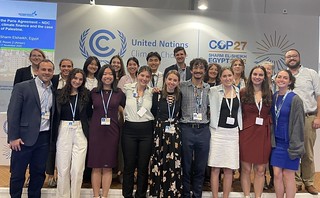 As I reflect on my experience attending COP27, there are several key takeaways I would like to discuss. My first takeaway is that I believe this experience is invaluable for both UConn graduate and undergraduate students and provides a transformative real-world component to their experience at UConn. Specifically, the UConn@COP Fellowship Program provides students direct exposure to learn about international policy negotiations, network with diplomats and business leaders, and connect with people from cultures around the world at an unparalleled scale. In 1995, COP1 had just under 4,000 attendees but this number has continued to swell with almost 50,000 attendees at COP27 making it by far the largest diplomatic gathering on earth. The scale of this conference reflects the overwhelming consensus by over 190 countries for the need to address climate change and the tremendous opportunity for students to derive value from attending this event as a springboard for professional development.
As I reflect on my experience attending COP27, there are several key takeaways I would like to discuss. My first takeaway is that I believe this experience is invaluable for both UConn graduate and undergraduate students and provides a transformative real-world component to their experience at UConn. Specifically, the UConn@COP Fellowship Program provides students direct exposure to learn about international policy negotiations, network with diplomats and business leaders, and connect with people from cultures around the world at an unparalleled scale. In 1995, COP1 had just under 4,000 attendees but this number has continued to swell with almost 50,000 attendees at COP27 making it by far the largest diplomatic gathering on earth. The scale of this conference reflects the overwhelming consensus by over 190 countries for the need to address climate change and the tremendous opportunity for students to derive value from attending this event as a springboard for professional development.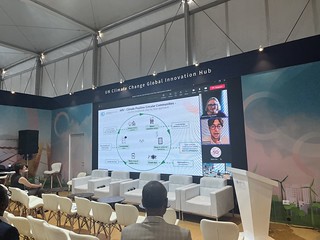
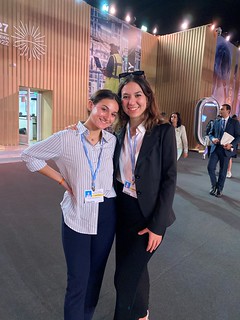 My hope for the future faltered originally on the very first day I attended the conference and listened to a panel about how corporations are resilient in the face of climate change. In this, there was simply no talk about the corporation’s plan for the future, or even what they’re currently doing to help reduce emissions and take part in the fight against climate change. Instead, all the speaker said were empty words that had no real meaning that fell along the lines of ‘we need to de-risk a small solution’ and that we must be ‘resilience multipliers,’ but what does that actually look like? What does that really mean? I remember being baffled at how little depth there was to the presentation, and walked out wondering if this was what the entirety of the COP27 discussions would be like. Thankfully, for the Earth and my sanity, it was not.
My hope for the future faltered originally on the very first day I attended the conference and listened to a panel about how corporations are resilient in the face of climate change. In this, there was simply no talk about the corporation’s plan for the future, or even what they’re currently doing to help reduce emissions and take part in the fight against climate change. Instead, all the speaker said were empty words that had no real meaning that fell along the lines of ‘we need to de-risk a small solution’ and that we must be ‘resilience multipliers,’ but what does that actually look like? What does that really mean? I remember being baffled at how little depth there was to the presentation, and walked out wondering if this was what the entirety of the COP27 discussions would be like. Thankfully, for the Earth and my sanity, it was not. 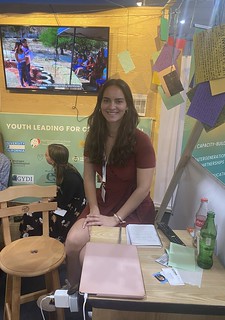
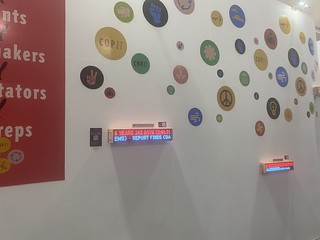 After my initial frustrations about not being able to contribute to international agreements, I realized change does not have to come about in such extravagant gestures. While the COP was a place for parties to meet internationally, it was also a place to share smaller successes that can be duplicated throughout local communities. I witnessed how youth were being involved in various spheres which made the problem of climate change not seem so daunting. Throughout my time at UConn I have been so focused on policy as the way to solve the climate crisis. What COP has put into perspective for me is that policy may be written and implemented by policy makers, but it is the attitude of the people that shape it. One way to shift such attitudes and accelerate the inclusion of new perspectives is through youth involvement and education. When kids can grow up learning about, experiencing and understanding our planet there is greater room for change. I always told myself I wouldn’t go into education. But I have since seen how influential my role in educating generations even beyond mine could be. Climate change is a crisis that my generation has inherited from generations before mine that did not deal with it. It is inevitable that the generations that come after mine will inherit the crisis however we choose to deal with it (or not). Climate change most likely won’t be solved in the next 30 years and even if it is, the Earth needs time to heal. One thing I hope I can do is leave the next generation with the adequate tools to continue on the work my peers and I are doing today. While this isn’t a path for myself that I have explored indepth, my time at COP has contributed to this new avenue.
After my initial frustrations about not being able to contribute to international agreements, I realized change does not have to come about in such extravagant gestures. While the COP was a place for parties to meet internationally, it was also a place to share smaller successes that can be duplicated throughout local communities. I witnessed how youth were being involved in various spheres which made the problem of climate change not seem so daunting. Throughout my time at UConn I have been so focused on policy as the way to solve the climate crisis. What COP has put into perspective for me is that policy may be written and implemented by policy makers, but it is the attitude of the people that shape it. One way to shift such attitudes and accelerate the inclusion of new perspectives is through youth involvement and education. When kids can grow up learning about, experiencing and understanding our planet there is greater room for change. I always told myself I wouldn’t go into education. But I have since seen how influential my role in educating generations even beyond mine could be. Climate change is a crisis that my generation has inherited from generations before mine that did not deal with it. It is inevitable that the generations that come after mine will inherit the crisis however we choose to deal with it (or not). Climate change most likely won’t be solved in the next 30 years and even if it is, the Earth needs time to heal. One thing I hope I can do is leave the next generation with the adequate tools to continue on the work my peers and I are doing today. While this isn’t a path for myself that I have explored indepth, my time at COP has contributed to this new avenue.